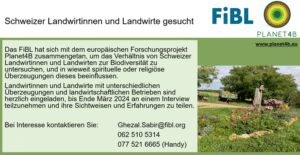Location: Switzerland
Lead partner: FiBL
Can religion be an impactful leverage point in propelling more biodiversity-positive agriculture?
Agriculture is one of the major drivers behind land use change and biodiversity loss. Whereas systemic and institutional values largely steer agriculture-relevant decision-making, personal values are one of the key determinants of environmental behaviour. But where do these values come from?
Many people use religion or a value-based system of beliefs to calibrate their moral compass, but very little is known about the relationship between faith and biodiversity decisions. Switzerland is predominantly Christian, with catholic and protestant the dominant doctrines, depending on the region. This case aims to explore how a farmer’s religion or value-based system of beliefs interacts with their farming and food consumption-related environmental behaviour.
The aim of the study is to learn farmers’ practices and attitudes towards nature and biodiversity and to determine which religious, cultural, and/or societal drivers are instrumental in forming their attitudes and guiding their practices. These may, or may not, come from different interpretations of the bible.
The main research questions are:
- In what ways are farmers influenced by their religious beliefs?
- What interpretations are farmers drawing from agricultural policies in light of their religious beliefs?

Invitation for farmers to participate in the case study (source: FiBL)
Expected impacts
Individual level
The case aims to include biodiversity in farmers’ “mindsets” when they are making practical decisions. Dialogues with farmers in the form of interviews are designed to draw attention to the link between religious beliefs and biodiversity.
Community level
It is expected that the farmers who are interviewed and the Learning Community members for the study become more attentive to biodiversity-related issues on their fields and in their communities as they see the link between their religious and spiritual beliefs and biodiversity. A public exhibition of the photos and videos shared by farmers to highlight the influence of their religious beliefs on their farming practices and decisions is being planned. This will provide a venue for the message of religion and biodiversity being connected to gain prominence in the public sphere with cascading effects on other spheres of society in addition to farming.
Institutional/Policy level
Understanding the current and potential influence of religion and spirituality on biodiversity related practices in farming facilitates the development of effective policies and incentives.
Biodiversity
The intervention in the study, which is to give prominence to the connection between religious beliefs and biodiversity, is expected to influence the mindset of actors such as farmers who can employ more biodiversity-promoting behaviours and who can start talking to their family and peers about this message, stirring pro-biodiversity change in the larger community. Their actions are expected to impact biodiversity in different ways.
Intersectionality dimensions
The main intersectionality dimension in this study is religion or value-based system of beliefs and culture. Gender and age are additional aspects examined.
Working approach
- An appreciative inquiry approach is utilised in data collection, seeing the farmers as experts sharing their perspective about the relationship between their religious or spiritual beliefs and farming behaviour that influences biodiversity.
- Having qualitative in-depth interviews with farmers and when possible, with their spouses, to explore the influence of religious and/or spiritual beliefs on agro-biodiversity related farming behaviour.
- Surveying farmers based on findings in the exploratory phase to test and concretise the findings.
- Using photovoice: photos, video clips to showcase how the farmers see the effect of their religious and/or spiritual beliefs on their farming practice
- Organising an exhibition based on the media (photos and videos) obtained from farmers showcasing the connection between their religious and spiritual beliefs and their farming practice.
Publications
«Gläubige Landwirte sind eher resilient»
“Was hat Religion mit Biodiversität zu tun?” in Bioaktuell
FiBL Focus 83: Gott bewahre – was Spiritualität mit Biodiversität zu tun hat
Gott bewahre die Artenvielfalt
